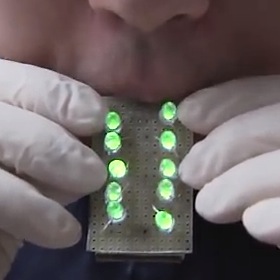December 27, 2013 — The same source of electricity that makes a spark jump from your finger to the doorknob on a dry day is gearing up to power smartphones, medical devices and more, thanks to an experiment gone awry that alerted scientists to the promise of turning small-scale movements into portable sources of power.
As reported in R&D magazine, it all started when Georgia Tech engineering professor Zhong Lin Wang and colleagues found themselves producing way more power than they expected from some piezoelectric generators they were studying. They discovered that the experimental apparatus had been put together wrong, causing two pieces of polymer material to rub against each other and generate extra electricity through what is known as the triboelectric effect. The effect occurs when two materials – one an electron acceptor, and the other an electron donor – come into contact and then separate through the application of some external force. When the materials touch, electrons move from the donor to the acceptor. When they move apart, the electrons seek to move to equalize the charge. All it takes to create current is a conduit for electron movement.
The unexpected event turned Wang’s attention to triboelectrification as a potential source of usable power. Manipulating materials and configurations, Wang and colleagues are now working to develop triboelectric generating systems that can harness the movement of electrons to do useful work and refining them to increase the range of materials that can be used and the amount of electricity they can generate. The researchers envision the phenomenon eventually being used to transform the mechanical energy of motion from sources such as walking, wind, waves and wheels into electrical energy to power personal electronics, medical devices, remote monitoring equipment and more.
Photo from video by Georgia Tech.
Ensia shares solutions-focused stories free of charge through our online magazine and partner media. That means audiences around the world have ready access to stories that can — and do — help them shape a better future. If you value our work, please show your support today.
Yes, I'll support Ensia!
